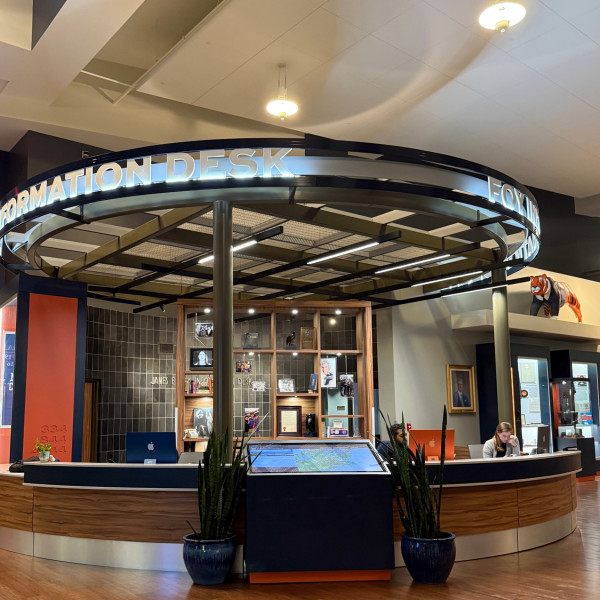On my first night at the desk, a student supervisor comes out to shake my hand. It’s Cora Baldwin, a senior about to finish her degree in software engineering. Her voice is soft and gentle, maybe a little nervous, like she’s afraid she might be intruding. She shows me around the desk and introduces me to the students answering the phones. “I’m not really sure how to host you,” she says, “but I want to make you feel welcome. What can we do?”
The students let me hover over their shoulders while they do their jobs. There’s a lot of “yes, ma’am” and “no, ma’am.” Students say they know which callers expect to be addressed that way. The thicker the southern accent, the greater the expectation.
Hours later, the building is quiet, Foy is about to close for the night, and we’ve likely heard the last of the calls. The students and I are circled up in our rolling chairs, and they’re telling stories about their favorite calls. Many they’ve never shared before. Like late-night conversations in college tend to do, the mood becomes confessional. Cora says she believes the calls she answers are the ones she’s meant to answer. No coincidences. I want to know whether there have been any calls that the students just can’t get out of their heads. One of them talks about the hour they spent on the phone with a caller, helping her plan a trip from Arizona to Canada. Another talks about a kid who called to complain that he was bored, but clearly he was alone and very, very lonely. That was a long call.
Then Cora tells us this: Two years ago, while working a day shift, she answered a call from an older gentleman. He had a list of celebrities and wanted her to look up their birthdays, month and day. “As I read out the dates, he would say something like ‘Mmmhmm, OK. OK, that makes sense.’” He told her that he could deduce things about people with no more information than that. They chatted about what Cora was studying, and what kind of career she had in mind. Another caller who needed someone to talk to, she figured. “Then he asked for my birthday.” When Cora told him, “He says, ‘Oh, you don’t want to be a software engineer, you want to work with people.’”
He was right, though Cora had never said it out loud. “Really, I’ve always had an affinity toward broken people,” she says. “I’d like to set up a commune for runaway girls. Growing up in my small town, people really didn’t go into protective services. They just stayed in their bad situations. I’d like to do that.” This is news to her colleagues on the desk, who have always pictured her as a coder. But it makes sense, they tell me. Cora is exactly the kind of person who should be taking in people who need help. “But I probably won’t,” she says, and shrugs. “I need a job.”
I say to her, “Still, when I asked you to name a call you can’t forget, that’s the one you brought up. It must have meant something to you.” It did, Cora admits. Like she said before, she doesn’t really believe in coincidences. But how that fits into her life, she can’t picture yet



